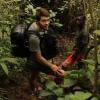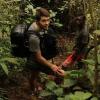Environmental DNA, or eDNA, is a molecular sampling technology that collects information about organisms using DNA shed by them into their environment. While eDNA holds exciting potential to become an efficient, low-cost, non-invasive ecological monitoring method, a lack of standardization of approaches and purpose-built sampling equipment make it hard to compare results and determine its actual effectiveness across studies. Detection success and accuracy also vary greatly among species and environments, making standardization a challenge.
However, as eDNA moves toward becoming an industry standard method for species detection and management, the equipment is beginning to transition from largely do-it-yourself experimental contraptions to professionally engineered tools. For example, Smith-Root Inc. recently developed the first-ever purpose-built eDNA sampling system, which they call ANDe™. We’re also seeing an expansion of eDNA applications from mainly marine to freshwater and even terrestrial environments, although the latter still requires substantial growth.
As this nascent field develops, it is critical for the conservation tech community to explore and identify how eDNA applies to management needs, and to ensure that continued development meets those needs. Beyond indicating species presence, research so far suggests that eDNA can contribute to conservation by deepening understanding of population dynamics, resource usage, disease presence, invasion pathways of non-native species, and population genetics, to name a few. This indicates that it could be a critical tool for managing imperiled and invasive species.
If you're new to eDNA and genomics, check out our Tech Tutors episode "How Do I Use Portable Genomics in the Field?" featuring Ineke Knot. You'll also find a bank of resources on that page, including a handy glossary of terms in our collaborative notes document!
Does your work involve eDNA and genomics, or are you curious about incorporating this type of technology into your field or lab work? Start a discussion in our group forum!
Header Image: Benjamin Barca
No showcases have been added to this group yet.
Woodland Park Zoo

- 0 Resources
- 5 Discussions
- 8 Groups
- 0 Resources
- 0 Discussions
- 14 Groups
San Diego Zoo Wildlife Alliance
- 0 Resources
- 5 Discussions
- 2 Groups
- @Prabisha
- | she/her
Dedicated research scientist with over 8 years of experience in cartography, spatial analysis, and statistical modeling to tackle environmental, public health, and socio-economic challenges. Passionate about leveraging geospatial technology to drive impactful solutions.
- 0 Resources
- 0 Discussions
- 12 Groups
- @Ziggy
- | She/Her
Aquatic biologist focused on aquatic invasive species and freshwater pearly mussels
- 0 Resources
- 0 Discussions
- 4 Groups
Zoological Society London (ZSL)
I am a benthic ecologist using low-cost tech to explore seabed habitats in temperate and cold water.

- 1 Resources
- 10 Discussions
- 4 Groups
- @Pema
- | He/Him/His
Naturalist/Wildlife Biologist
- 0 Resources
- 0 Discussions
- 1 Groups
- @Alawa
- | She/Her
Passionate wildlife and biodiversity conservationist
- 0 Resources
- 0 Discussions
- 24 Groups
- @mattaudette
- | he, him, his
Software Tester and Test Automator at Wildlife Protection Solutions
- 0 Resources
- 1 Discussions
- 24 Groups
- @williams
- | He/Him
I am a conservationist specializing in endangered species, particularly vultures. As the Endangered Species Conservation Coordinator/Co-Founder at Biota Conservation Hub Foundation (BiotaCHF), I have conducted extensive research/conservation of vultures and other water birds.
- 0 Resources
- 0 Discussions
- 14 Groups
- @tmcgrath
- | He / Him
Geographer, Program Manager, Engineering Manager
- 0 Resources
- 1 Discussions
- 11 Groups
- @TheDataEnthusiastic
- | He/Him
Hi, I'm pursuing Master's in Data Science. And I want work help protect nature and wildlife.
- 0 Resources
- 0 Discussions
- 13 Groups
Join us in celebrating this year’s Community Choice Award winners!
15 August 2024
Vote for your favorite submissions that best demonstrate conservation impact, novel innovation/discovery, and strong storytelling of the work and the sector.
12 August 2024
WildLabs will soon launch a 'Funding and Finance' group. What would be your wish list for such a group? Would you be interested in co-managing or otherwise helping out?
5 June 2024
Now accepting applications for two $15,000 grants to help protect wildlife through cutting-edge, technology-driven efforts
3 June 2024
Do you have photos and videos of your conservation tech work? We want to include them in a conservation technology showcase video
17 May 2024
Article
Read in detail about how to use The Inventory, our new living directory of conservation technology tools, organisations, and R&D projects.
1 May 2024
Article
The Inventory is your one-stop shop for conservation technology tools, organisations, and R&D projects. Start contributing to it now!
1 May 2024
This study investigated the accuracy of eDNA and electrofishing as alternative methods for assessing diversity.
14 February 2024
A set of highly discriminating STR DNA markers developed in a collaboration between the SASA wildlife forensics lab and University of Leicester researchers is being used to detect laundering of wild peregrine falcons...
13 February 2024
The eDNA Collaborative is partnering with Experiment to offer $80,000 in small grants to support projects that demonstrate novel approaches in marine eDNA collection, analysis, or application. Submission Deadline:...
12 February 2024
Article
eDNA Collaborative and Experiment Partner to Provide $80K in Grants--Apply Now!
9 February 2024
A portable nanopore DNA sequencer has been used to determine the species of origin of bushmeat intercepted at Brussels Airport during a day of baggage searches.
6 February 2024
November 2023
event
6 Products
Recently updated products
| Description | Activity | Replies | Groups | Updated |
|---|---|---|---|---|
| Hola, Alen! I'm a veterinarian too and this device is being developed thinking of you and your colleagues. We want field veterinarians to be able to collect more samples with less... |
|
Emerging Tech, eDNA & Genomics | 1 month 3 weeks ago | |
| Thank you for your reply, ChadI meant 10 as a whole, indeed. Perhaps you see your post in one group, but since it is tagged for all groups, I assumed you meant 10 in total.In your... |
|
Acoustics, AI for Conservation, Animal Movement, Camera Traps, Citizen Science, Climate Change, Community Base, Connectivity, Drones, eDNA & Genomics, Emerging Tech, Funding and Finance, Geospatial, Human-Wildlife Coexistence, Software Development, Wildlife Crime | 1 month 3 weeks ago | |
| Hi @skirchgeorg , thanks for the additional info. We discuss again about this with my colleague and we were still hesitating with the drone, as it will still make some noise that... |
|
Drones, eDNA & Genomics | 4 months 2 weeks ago | |
| Hi Nabil,What medium do you want to sample for your eDNA (soil/air/water)? If its soil then you can simply collect a sample in a bag and freeze.This is a nice soil collection... |
|
eDNA & Genomics | 5 months 3 weeks ago | |
| Hi all, I am trying to find simple pre-assembled eDNA sampling kits like these below but for sale in North America. Is that... |
|
eDNA & Genomics | 6 months ago | |
| Hi Simon,We (Reneco International Wildlife Consultants) have an ongoing collaboration with a local University (Abu Dhabi, UAE) for developing AI tools (cameratrap/drone... |
|
Acoustics, AI for Conservation, Animal Movement, Camera Traps, Citizen Science, Connectivity, Drones, Early Career, eDNA & Genomics, Marine Conservation, Protected Area Management Tools, Sensors | 6 months 4 weeks ago | |
| Hi Muhammed,If you want any help with ONT please contact me |
|
eDNA & Genomics | 7 months 1 week ago | |
| Hi Phil, Thanks for sharing - this is really interesting work! Seems like a cool integration of ground-based (or ocean-based) data and satellite data, with a community... |
|
Geospatial, Acoustics, Camera Traps, eDNA & Genomics | 10 months 2 weeks ago | |
| Thank you so much! Now everything is in the hands of amazing organizations and companies! But the first results of the Disaster Management cohort are bringing a very optimistic... |
|
AI for Conservation, Climate Change, Early Career, East Africa Community, eDNA & Genomics, Emerging Tech, Ending Wildlife Trafficking Online, Human-Wildlife Coexistence, Open Source Solutions | 1 year ago | |
| Hello everyone, I'm interested in gathering insights on how the behavior of different species impacts the development and efficacy of... |
|
Animal Movement, Acoustics, Camera Traps, eDNA & Genomics, Emerging Tech, Marine Conservation | 1 year 4 months ago | |
| Hi everyone. I'm still confused about this. Is it feasible to employ environmental DNA (eDNA) for the detection of two distinct communities... |
|
eDNA & Genomics | 1 year 5 months ago | |
| Thanks Aude, very useful. Will reach out to them! |
|
Early Career, Acoustics, eDNA & Genomics, Marine Conservation, Protected Area Management Tools | 1 year 7 months ago |
Claude Miaud's eDNA presentation at 2015 Fuller Symposium
7 December 2015 3:12pm
7 January 2016 11:09am
Article about Claude Miaud's presentation at the Fuller Symposium:
https://www.wildlabs.net/resources/thought-pieces/biodiversity-drop-water-new-opportunity-edna
Deep Coral Reef Exploration and Discovery: Two-way Technological Flow
24 December 2015 12:00am
Biodiversity in a Drop of Water: The New Opportunity of eDNA
24 December 2015 12:00am
1 August 2025 10:09am
eDNA sampling to detect invasive snails in shipping ballast water
15 December 2015 5:04pm
16 December 2015 12:05am
Thank you for sharing!
eDNA news blog
7 December 2015 4:26pm
Extensive eDNA review
7 December 2015 3:42pm
What is eDNA?
2 November 2015 12:00am
1 August 2025 10:14am











































15 December 2015 4:47pm
Thanks for sharing this, Sarah.